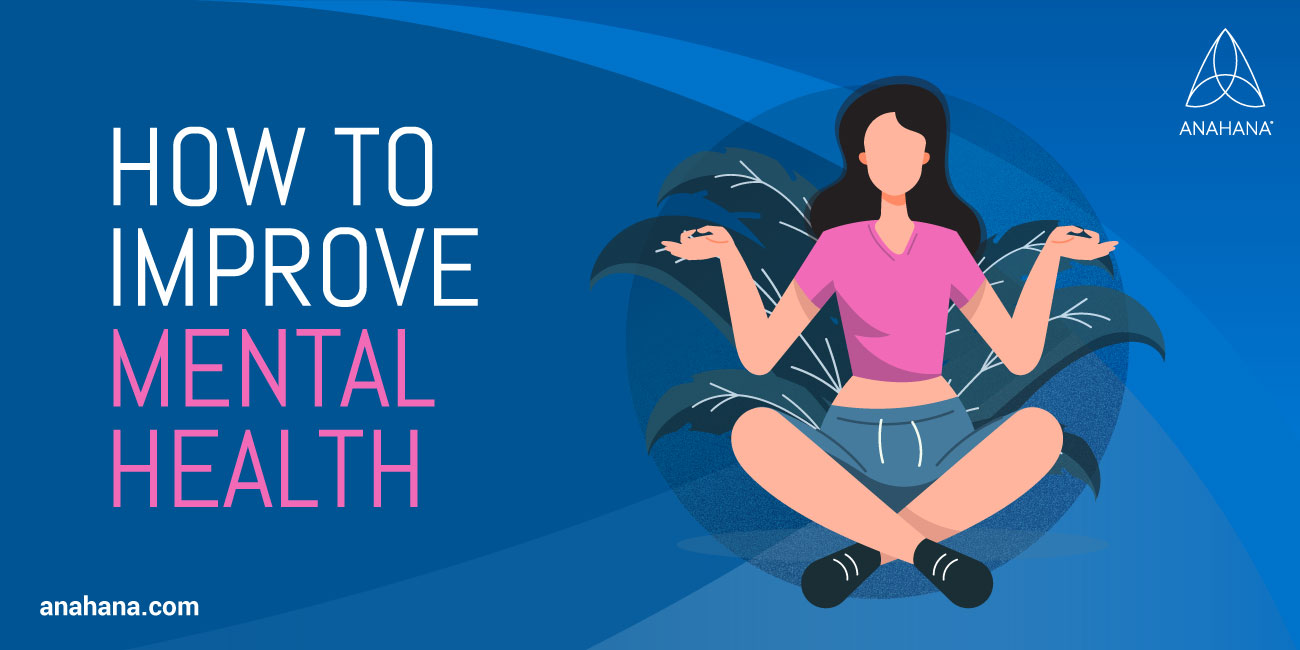
Table of Contents
Mental health encompasses many aspects of mental well-being, including psychological, emotional, spiritual, and social factors. It is normal for mental health to fluctuate over a person’s lifetime.
Working on improving mental health has many benefits, including improving physical health, social connections, academic and career success, and overall life satisfaction.
Mental Health
Mental health is essential for our overall well-being, influencing how we think, feel, and interact with the world around us. Despite its importance, it's often overlooked in the busyness of everyday life.
In this article, we will explore what mental health entails, identify signs of good mental health, discuss strategies to nurture it and delve into common mental illnesses to understand what those experiences are like.
By shedding light on these topics, we hope to foster greater awareness and promote a culture of understanding and support for mental health in our communities.
What is Mental Health?
Mental health encompasses emotional, psychological, and social well-being, beyond the absence of illness, aiding our resilience and adaptability.
According to the American Psychological Association (APA), it involves emotional well-being, behavioral adjustment, and the ability to cope with life's demands.
Understanding mental health as a continuum reminds us that it is normal to experience fluctuations in our emotional and psychological states over time. Just as our physical health may vary from day to day, our mental health also undergoes fluctuations in response to life's ups and downs.
Moreover, mental health is not solely determined by individual factors; it is also influenced by social, environmental, and cultural contexts. Factors such as access to resources, socioeconomic status, social support networks, and exposure to stressors all play a role in shaping our mental health outcomes.
Signs of Good Mental Health
Recognizing signs of good mental health can help us gauge our overall well-being. These indicators go beyond just the absence of mental illness or mental health problems, but show us when we are aligned and grounded. Here are some common signs:
Emotional Resilience
Good mental health often means we have the ability to bounce back from tough times, face challenges, and still find a sense of calm in the storm.
Healthy Coping Mechanisms
When we're mentally well, we tend to have healthy outlets for stress—like taking walks, talking with friends, or simply finding ways to relax and unwind.
Self-awareness and Emotional Regulation
Self-awareness is about understanding your own feelings, needs, and boundaries—what makes you uniquely you. It's recognizing where you feel most like yourself and honoring those spaces. Emotional regulation is the ability to handle emotions at the moment or recognize when you're feeling dysregulated. It involves having effective ways to work through challenges, including taking breaks or seeking support when needed.
Positive Relationships
Having meaningful connections with loved ones provides us with support, understanding, and a sense of belonging that enriches our lives.
Sense of Purpose and Meaning
Feeling that we're part of something meaningful, whether through work, hobbies, or relationships, adds depth and fulfillment to our lives.
Ways To Support Your Mental Health

Taking care of our mental health is like tending to a garden—it requires attention, nurturing, and gentle care. Here are some practical ways we can nurture our mental well-being.
Connect with Yourself
Connecting with yourself means recognizing your needs and boundaries. Take moments to reflect on how you truly feel in certain situations, regardless of the expectations of those around you.
Your needs are just as important as anyone else's, so don't hesitate to prioritize them. Remember, compromise is flexible, but sacrificing your core needs to please others can leave you feeling depleted.
Prioritize Self-Care
Make time for activities that replenish you, whether it is a quiet walk in nature, losing yourself in a good book, or simply indulging in a bubble bath.
Remember, self-compassion is key—treat yourself with the same kindness and understanding you would offer to a dear friend.
Practice Mindfulness and Meditation
Practicing mindfulness and meditation offers a chance to pause and find peace. Taking a few moments each day to sit quietly, breathe deeply, and let go of distractions can help us feel calmer and more centered.
Nurture Physical Health
Mental and physical health go hand in hand. Take care of your body by nourishing it with a balanced diet, regular exercise, and enough sleep. These seemingly small acts can improve mental health and quality of life.
Cultivate Gratitude
Gratitude is like a magnet for positivity—it has the power to shift your perspective and transform your life. Start a gratitude journal and take moments each day to reflect on the things you're thankful for. Even on the toughest days, there's always something to be grateful for.
Seek Help from a Mental Health Professional
Many people seek help from a mental health professional when their mental health continues to negatively affect their well-being.
Mental health professionals can help us find strategies, and coping mechanisms, provide support, and be objective to discuss our feelings and experiences with.
Taking care of your mental health is a journey of self-discovery and self-compassion. Remember, every small step you take matters, and every effort you make to nurture your mental health adds up over time.
The Different Facets of Mental Health
In the journey toward wholeness, we encounter various facets or buckets that contribute to our overall state of being. These buckets represent different dimensions of our inner world, each deserving attention and care.
-
Emotional: Embrace the full spectrum of emotions, allowing them to flow freely and acknowledging their validity without judgment. Reflect on your feelings regularly, journaling or engaging in mindful practices to relax your mind
-
Relational: Foster authenticity in interactions, cultivate vulnerability, and nurture self-compassion. Practice active listening in conversations and express your own experiences openly to deepen connections with others and yourself
-
Social and Communal: Cultivate meaningful connections within communities, online or offline. Engage in activities that foster camaraderie and understanding, and embrace the diversity of human connection. Consider joining clubs or groups aligned with your interests to strengthen social bonds
-
Spiritual: Reflect on your values and beliefs, finding solace in quiet moments of contemplation or meditation. Engage in practices that nourish your spirit and connect you to something greater than yourself
Why Mental Health Matters
Mental health is the backbone of our well-being, shaping how we navigate life's challenges and appreciate its joys.
-
You can enjoy life to the fullest: When we tend to our mental health, we invite joy and vitality into our days. It's about savoring the small wonders—a shared laugh with a friend, a quiet moment of reflection—and finding beauty in the ordinary
-
You will build confidence: Nurturing our mental well-being strengthens the bedrock of our confidence. It's about acknowledging our resilience in the face of challenges and recognizing the wisdom gained from overcoming adversity
-
Your goals will be easier to attain: A sound mind provides the clarity and resilience needed to pursue our dreams with intention and purpose. It's about aligning our actions with our aspirations and embracing the journey toward fulfillment
Think of a goal that speaks to your heart’s desires. By nurturing your mental well-being—setting boundaries, and practicing self-compassion—you create a fertile ground where dreams take root and flourish.
In essence, prioritizing our mental health is a sacred act of self-love and self-discovery. It involves honoring our inherent worth, embracing our vulnerabilities, and finding strength in the journey.
Mental Health vs. Mental Illness - What’s the Difference?
Mental health and mental illness are both aspects of our emotional and psychological well-being.
Mental health refers to our overall state of emotional and psychological wellness. It's about feeling content, coping well with stress, and maintaining positive relationships.
On the other hand, mental illness involves conditions that affect our thoughts, feelings, and behaviors in ways that make it difficult to function in daily life. Conditions like depression, anxiety disorders, bipolar disorder, and schizophrenia are examples of mental health disorders.
It's important to recognize that mental health exists on a spectrum, just like physical health. We all have times when we feel stressed, anxious, or down, but these feelings usually pass. However, mental illness involves more persistent and severe symptoms that can interfere with our ability to lead fulfilling lives.
Normalize Not Always Feeling Okay
“You don’t have to be positive all the time. It’s perfectly okay to feel sad, angry, annoyed, frustrated, scared, or anxious. Having feelings doesn’t make you a ‘negative person.’ It makes you human," ― Lori Deschene, Tiny Buddha
In our conversations, we often mix up "mental health" and "mental illness," but they're not the same. Understanding this difference helps us treat people with empathy, fight stigma, and make our communities more inclusive.
-
Poor Mental Health Isn’t Always Mental Illness: Not all struggles with mental health signify a diagnosed mental illness or a mental health condition. Just as physical discomfort doesn't always mean a chronic condition, emotional challenges may not meet the criteria for a mental health disorder. Recognizing this difference helps us understand mental well-being more accurately
-
Stigma: Our hesitation to discuss "mental illness" perpetuates the idea that it's something taboo or negative. Unlike physical conditions, mental health conditions often carry a stigma. However, openly addressing mental illness helps normalize it and encourages understanding and empathy. This normalization makes it easier for people to seek help without feeling ashamed or judged
Mental Health on a Continuum

The Mental Health Continuum Model provides a compassionate understanding of mental health needs, recognizing the diverse spectrum of human experiences. Rather than viewing mental health as a binary concept of healthy or ill, the continuum acknowledges the fluidity of our mental states.
Optimal mental health represents fulfillment, resilience, and emotional well-being, fostering grace and connectedness amid life's challenges. Conversely, mental health difficulties and vulnerability denote periods of heightened anxiety, depression, or emotional turmoil.
Yet, the continuum model highlights the dynamic nature of these experiences, as we navigate stressors, life events, and personal growth. It encourages embracing the full spectrum of human emotions with empathy and seeking support when needed.
Understanding this model reminds us that it's normal to experience fluctuations in mental well-being and encourages us to prioritize self-awareness and healing. Each step along our unique mental health journey contributes to our growth and well-being.
When to Seek Professional Help
Feeling a bit off balance from time to time is natural; moments of sadness, worry, fear, or doubt are part of being human. However, when these feelings persist and start to disrupt your daily life over an extended period, it may be a sign to seek support.
Signs to look for:
-
struggling to connect with family, friends, colleagues, or classmates
-
finding it hard to enjoy the things you used to love
-
feeling overwhelmed and unable to handle everyday challenges
-
noticing changes in your sleep (e.g., sleeping way less or more than usual) or eating habits
-
feeling down, anxious, or constantly on edge
-
having trouble focusing or making decisions
-
turning to unhealthy habits or substances to cope with your emotions
Remember, seeking professional help for your mental health needs is a courageous step toward healing and well-being. Whether you confide in a family member or friend, or seek guidance from a mental health professional or other mental health services, getting help is an act of self-compassion. You deserve assistance and direction on your journey toward mental well-being.
Frequently Asked Questions
What are common signs of mental health difficulties?
Mental health difficulties can manifest in various ways, such as persistent feelings of sadness or anxiety, changes in sleeping or eating patterns, difficulty concentrating, or engaging in risky behaviors. These challenges are often influenced by biological factors and environmental stressors and can impact our overall well-being.
Where can I find support for mental health concerns?
Organizations like Mental Health America and local community mental health centers offer valuable resources and support for individuals facing mental health challenges. These centers provide access to counseling, therapy, and other mental health services to help people navigate their journey toward healing and recovery.
How effective is mental health treatment?
Mental health treatment can be highly effective in managing and addressing sub-clinical and diagnosable mental disorders. Through therapy, medication, and holistic approaches, individuals can develop coping strategies, improve their emotional well-being, and lead fulfilling lives. It's important to remember that treatment looks different for everyone, and finding the best approach for you can take time.
References
What Is Mental Health? | MentalHealth.gov
Psychiatry.org - Stigma, Prejudice and Discrimination Against People with Mental Illness
The Mental Health Continuum Model (MHCM) | Government of Canada
Disclaimer
The contents of this article are provided for informational purposes only and are not intended to substitute for professional medical advice, diagnosis, or treatment. It is always recommended to consult with a qualified healthcare provider before making any health-related changes or if you have any questions or concerns about your health. Anahana is not liable for any errors, omissions, or consequences that may occur from using the information provided.

By: Anahana
The Anahana team of researchers, writers, topic experts, and computer scientists come together worldwide to create educational and practical wellbeing articles, courses, and technology. Experienced professionals in mental and physical health, meditation, yoga, pilates, and many other fields collaborate to make complex topics easy to understand.